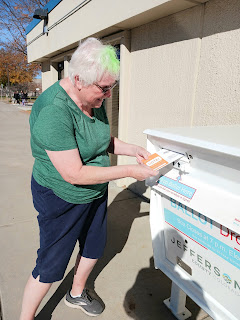I'm up later than usual this morning. The traditional polling places open at seven in the morning, the first Tuesday following the first Monday in November. So if I were going to the polls, I would not be first in line.
This is my polling place! But first breakfast.
Since we live in Colorado, we can vote anytime after we receive our ballots in the mail. We got ours a couple of weeks ago. And about a week before that we received our Ballot Information Booklets -- One from the State for elective offices and statewide questions and issues and one from our county for questions and issues pertaining just to our county.
These booklets give the titles and text of the questions we are voting on plus a summary and analysis of those questions including arguments for and against and the fiscal impact of the question.
For example: Amendment E to the state constitution, Extend Homestead Exemption to Gold Star Spouses "reduce property taxes for the surviving spouses of both United States Armed Forces service members who died in the line of duty and veterans who died as a result of a service-related injury or disease." Plus arguments for and against this amendment and the Fiscal Impact "Amendment E will increase state spending by $288,000 in state budget year 2023-24 to cover the reimbursements [to the counties who normally benefit from property taxes] authorized in the measure."
The State booklet also gives information about the judges being considered for retention. In Colorado, judges for the State Supreme Court, the Court of Appeals and the District Courts are selected through assisted appointment -- the governor selects a nominee from a list provided by a nominating commission. Those judges then come up for Retention votes two years after their initial appointment, then after 10-year-terms for the Supreme Court Justices, 8-year-terms for Appellate Court judges, and 6-year-terms for District Court judges. We vote yes or no on each judge up for retention.
An independent research firm conducts judicial performance surveys on judges. Commissions made up of attorney and non-attorney volunteers evaluate the information collected and makes recommendations of "meets performance standards" or "does not meet performance standards" which we voters can use to decide our vote. Good information for those of us who do not have courtroom experience with our judges, thank goodness.
When it comes to candidates running for the various and sundry offices, we voters are on our own.







No comments:
Post a Comment